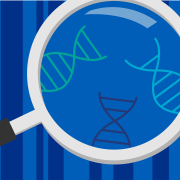Personalised medicine will be at the heart of the future NHS
The future of the NHS will be a personalised medicine service with genomics at its core, according to a new strategy adopted by NHS England
The Personalised Medicine Strategy will see many treatments move away from the traditional one-size-fits-all approach to one based on a comprehensive diagnostic and clinical characterisation, with the aim that the right patient gets the right treatment at the right time.
This personalised approach will require a transformation in the way care is thought about and delivered across the clinical professions, from audiology to vascular surgery, from physiotherapy to pharmacy. Health Education England’s Genomics Education Programme is helping NHS staff to stay ahead of these changes through fully funded CPPD modules and other learning resources covering genomics.
Why genomics is so important
Genomic testing is already used in certain circumstances, but to date this has predominantly been the reserve of specialists – either to determine the genetic basis for a disease or to select the most appropriate form of treatment; for example, in cancer certain tests are already used to determine which therapy will be the most effective for an individual, such as the use of Herceptin for ‘HER2 positive’ cancers.
As genomic medicine starts to provide us with more information to help tailor treatment quickly and efficiently, as well as to reduce the cost of mistreatment, the NHS has begun to develop a strategy that will incorporate genomics across medical care. Imagine being able to detect a gene variation before it becomes a problem. Imagine being able to give an individual a drug, or advice, to mitigate problems, or to effectively target diseased cells without affecting healthy cells. These are the possibilities of genomics.
The 100,000 Genomes Project
The foundations for a personalised medicine service across the NHS are being laid by the work of staff at newly established Genomic Medicine Centres, charged with supporting and delivering the 100,000 Genomes Project. Using the most up-to-date technology – particularly, whole genome sequencing, which analyses an individual’s complete genetic code – the project aims to develop and understand new links between genomics and disease, opening up a wealth of new diagnostic and therapeutic possibilities.
The NHS carries out more than a billion diagnostic tests every year, but we are only just learning the potential of genomics. The hope is that the 100,000 Genomes Project will contribute to increased understanding and produce reliable evidence that can be used to transform the health service.
Transforming the workforce
As the importance of genomics moves beyond certain professional specialties into the mainstream, the upskilling and transformation of the workforce will be one of the health service’s greatest challenges. All health practitioners across the NHS will need to have an awareness of genomics and its role in care, as well as developing the skills necessary to fully realise its potential.
To aid this process, the HEE Genomics Education Programme has developed a wide range of resources, particularly CPPD modules modules for the general workforce, and will be continuing this work as learning develops – including contributing to the development of various curricula to ensure genomics is taught as part of the basic training across all clinical professions.
–









